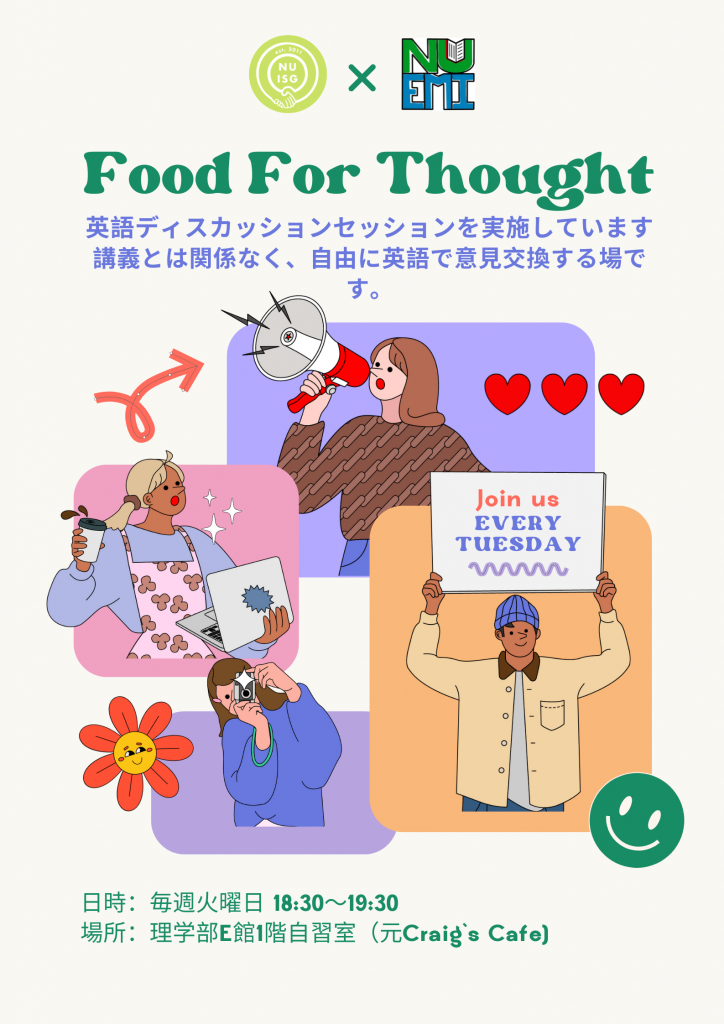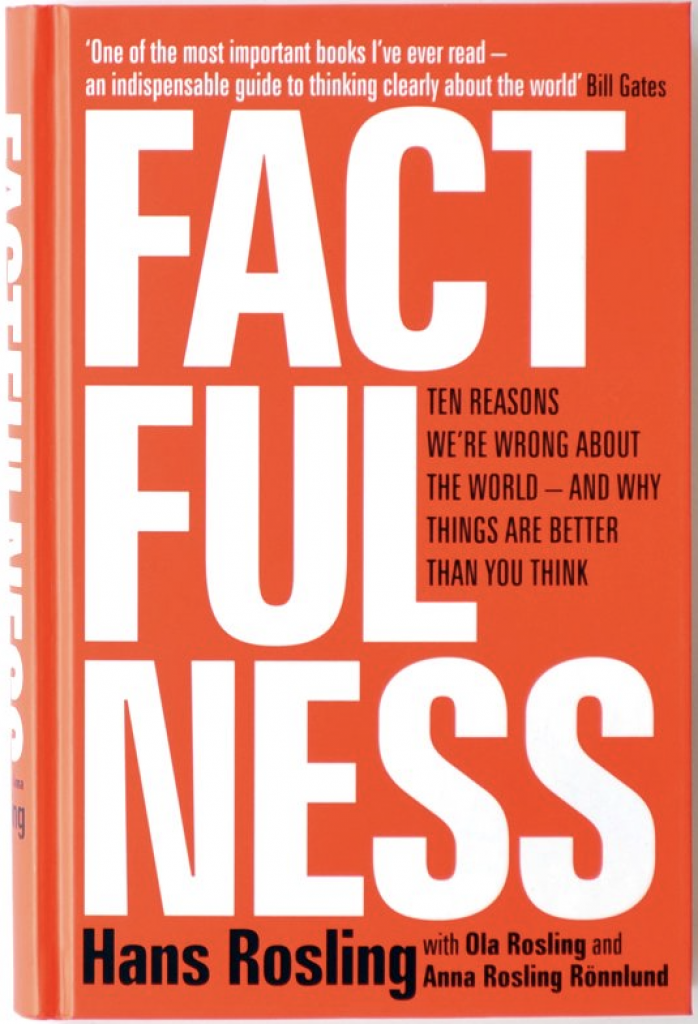Food for Thought, every Tuesday. See you next on Jan 24th at 6:30pm 1/24(火)午後6:30より<今学期は終了しました>
みなさん、こんにちは。
1月も半ばになりましたね。みなさん、いかがお過ごしでしょうか。今週からFood for Thought再開します。
Hi, everyone. How have you been. We are restarting Food for Thought!
講義とは関係なく、自由に英語で意見交換する場です。名大生ならば誰でも参加OK
Food for Thought is a casual discussion space for NU students in all programs to share ideas in English. We talk about a topic that the host of the session has chosen. Any Nagoya University student can join. Join in and have fun together!
Target audience/対象者:All NU students/ 一般日本人学生、G30国際プログラム学生
Day/開催日 : Every Tuesday except holidays 火曜日(祝日,12/27, 1/3,10以外)
Time/時間 : 18:30-19:30
Venue/場所:理学部E館1階自習室(元Craig`s Cafe)/ Former Craig's Cafe, 1st Floor Science Building E
登録不要、Only in person/ 対面のみ
< Next 次回 >
今学期のFood for Thoughtは終了しました。
<Past FFT sessions>
"Food For Thought" 英語 Discussion
Tuesday, January 24th/ 1月24日(火) PM 6:30〜7:30
Host: Gia
Topic: ChatGPT and the Dominance of AI/ Chat GPT とAIの支配
Last week, we talked about how to give an impromptu speech. But probably you don’t need Gia to help you with speech anymore (just kidding). Access ChatGPT and ask “How to give a speech” and it will give you a very proper answer.
Nowadays, AI can write, draw, or probably do anything that a human can do. Do you think it is beneficial? Or is it a threat to society? I guess you must go to this week’s FFT to find out.
先週は、即興スピーチの方法についてお話しました。でも、もうGiaにスピーチを手伝ってもらう必要はないでしょう(冗談です)。なぜなら、ChatGPTにアクセスして、「スピーチの仕方」と聞けば、とても適切な答えが返ってくるからです。これは有益なことだと思いますか?それとも社会にとって脅威でしょうか?今週のFFTに参加して、どうなのか確かめてくださいね。
"Food For Thought" 英語 Discussion
Tuesday, January 17th/ 1月17日(火) PM 6:30〜7:30
Host: Gia
Topic: Impromptu Speech 即興のスピーチ
Have you ever spoken anything in front of a crowd without rehearsal? Probably sometimes in your life. Do you think Oscar nominees always prepare a speech just in case they win the prize? I don’t think so.
Such situations require lots of improvisation. It can be intimidating, yet with practice and experience, becoming an expert on impromptu speech is guaranteed.
In this week’s FFT, let’s imagine ourselves winning Oscar/Grammy/Nobel prizes, and practicing public speaking together!
あなたは、リハーサルなしに大勢の前で何かを話したことがありますか?おそらく人生の中で時々あることでしょう。アカデミー賞の候補者は、受賞したときのためにいつもスピーチを用意していると思いますか?私はそうは思いません。
そのような状況では、多くのアドリブが必要です。しかし、練習と経験を積めば、即興スピーチのエキスパートになることは保証されているのです。
今週のFFTでは、オスカー賞、グラミー賞、ノーベル賞を受賞した自分を想像しながら、人前で話す練習をしてみましょう。
"Food For Thought" 英語 Discussion
Tuesday, December 20th/ 12月20日(火) PM 6:30〜7:30 (今月最後 last session for this month)
Host: Mariko
Topic: Why we should celebrate both our successes and failures 成功と失敗の両方を称えるべき理由
Celebrating failure is just as important as celebrating success. Celebrating success is just as important as celebrating failure. Do these statements make sense to you? Have you heard something similar in the past?
As the year comes to a close, we tend to be more reflective in nature. We might find ourselves asking questions like “did we do enough?”, “did we achieve what we originally had in mind?” or “did we just mindlessly spend another year of our lives thinking and doing unimportant things?”
Why is it so easy for us to criticize ourselves for our shortcomings and praise others for their triumphs yet find it uncomfortable or an act of arrogance to acknowledge our own victories and the praises we receive from others? This Tuesday, let’s talk about our failures and successes this year and why celebrating not just either, but both, is important for our personal growth.
失敗を称えることは、成功を称えることと同じくらい重要である。
成功を称えることは、失敗を称えることと同じくらい重要である。
このことは、あなたにとってしっくりくるものでしょうか?いままでに似たようなことを聞いたことがありますか?一年が終わると、私たちはより内省的になる傾向があります。「ちゃんと頑張れたかな。」「当初の目標を達成できたかな。」「ただ、何気なく一年を過ごしてしまったかな。」さて、自分の欠点を批判し、他人の成功を褒めるのは簡単なのに、自分の成功や他人からの賞賛を認めるのは不快で傲慢な行為だと感じるのはなぜでしょう?
今週の火曜日は、今年の失敗と成功について、そして、なぜどちらか一方だけでなく、両方を称えることが私たちの成長に重要なのかについて話しましょう。
"Food For Thought" 英語 Discussion
Tuesday, December 13th/ 12月13日(火) PM 6:30〜7:30
Host: Shuren Topic: Languages and Morality 言語とモラル
One of the magical abilities that we humans have is language and our ability to speak. We transmit our thoughts, emotions, and imaginations into words by making sounds, tones, hisses, and puffs as we exhale. Then those air vibrations we create travel in the air and hit others’ eardrums and get translated back into thoughts. Thus, in other words, language is an invisible chain of vibrations that starts with one’s thought and transforms into another thought.
With this ability, we are able to pass knowledge, experience, and wisdom across generations, and perhaps, this magical ability is what separates us from other species of animals. However, over 7000 languages are spoken around the world and every single one of them differs from one another in many ways. Their sentence structure, sound, tone, interjections, writing systems, and ideograms. From these differences, the question of ‘Does language shape the way we think, and can it affect morality?’ arises.
Like many other people who speak more than one language, I often have the sense that I’m a slightly different person in each of my languages—more assertive in English, more relaxed in Mongolian, and more sentimental in Japanese language. Then:
1. Is it possible that, along with these differences, my moral compass also points in somewhat different directions depending on the language I’m using at the time?
2. Do we change or switch our personalities when we switch the languages we speak?
Let’s try to find the answer to these questions through our discussions in the upcoming Food For Thought session on the 13th of December.
私たち人間が持っている不思議な能力のひとつに、言語と話す能力があります。私たちは、息を吐くときに、音、音色、シッと言う音や、息を出すことによって、自分の考え、感情、想像を言葉にして伝えています。そして、その空気の振動が空気中を伝わって、他人の鼓膜に当たり、また思考に変換されるのです。この能力によって、私たちは世代を超えて知識、経験、知恵を伝えることができ、この不思議な能力こそが、他の動物種と異なる点なのかもしれません。しかし、世界では7000を超える言語が話されており、その一つひとつが多くの点で互いに異なっている。文の構造、音、声調、間投詞、書き方、表意文字など、その違いは多岐にわたる。複数の言語を話す他の多くの人々と同様、私も、英語ではより自己主張が強く、モンゴル語ではよりリラックスし、日本語ではより感傷的になるなど、それぞれの言語で自分は少し違う人間であるという感覚を持つことがよくあります。
では ここで2つの問いが浮かんできす。1. このような違いに加えて、私の倫理観も、その時々の言語によって多少異なる方向を向いているのだろうか。2. 言語が変わると、私たちの人格も変わるのだろうか?
12月13日に開催するFood For Thoughtでは、このような疑問に対する答えを一緒に考えてみましょう。 www.DeepL.com/Translator(無料版)で翻訳しました。
"Food For Thought" 英語 Discussion
Tuesday December 6th/ 12月6日(火) PM 6:30〜7:30
Host: Taiga Topic: Design | Rule that Makes Your Words Attractive, and Powerful デザイン|言葉を魅力的に、そして力強く伝えるためのルール
How do you often convey your ideas? Presentation?, report?, or oral address? Here, I think the design of the material is one of the keys to making your words understandable. The design of slides and posters is important to convey information and make it attractive.
Let’s take a look at some examples, and discuss what makes the design powerful. Finally, you will find the principles of powerful design. Let’s share your opinion, experience, and ideas!
あなたは普段、自分の考えをどのように伝えていますか?プレゼン?、報告書?、口頭での挨拶?ここで、自分の言葉をわかりやすく伝えるためには、資料のデザインが一つのカギになると思います。スライドやポスターのデザインは、情報を伝え、魅力的にするために重要です。いくつかの例を見ながら、デザインを力強くするポイントについて考えてみましょう。最後に、パワフルなデザインの原則を見つけることができます。あなたの意見、経験、アイデアを共有しましょう!
Tuesday, November 29th/ 11月29日(火) PM 6:30〜7:30
Host: Mariko Topic: Rejection
Why are we so bothered by a lower Instagram Like count in one of our latest posts? Why does someone not liking our favorite food or our new hairstyle frustrate us? Why would something so seemingly insignificant make us feel angry or annoyed at our friend and bad about ourselves? Why does it ruin our mood? Why do we hate feeling disliked?
We experience getting rejected quite frequently in our lives. If we think about it, because of how often rejections happen, shouldn’t we get better and better at taking them until the point that we’re not bothered by them at all? Sadly, for most of us, that is not the case. No matter how many times we go through rejections, a new one stings and so will the next one (and probably the next one too). Our risk of rejection keeps getting higher and higher due to the advent of the Internet. Whether it be social media or dating apps, we are all connected to countless people and any of whom might ignore our posts, stories, chats, or dating profiles and leave us feeling rejected. Additionally, we are still vulnerable to serious and more devastating rejections. If we don’t get accepted to university, scholarship or exchange program or if we’re snubbed by our friends, criticized by our families and communities for our lifestyle choices, the pain we feel can paralyze us and even make us question how we perceive ourselves. Regardless of how big or small the rejection we experience is, the one thing constant is that it always hurts, and it usually hurts more than we expect it to. This Tuesday, let’s talk about our own experiences of getting rejected, how we acted in response, and why getting rejected cuts us deep and ways we can deal with them better.
なぜ私たちは、インスタの最新の投稿で「いいね!」数が少ないと気になるのでしょうか?なぜ、誰かが私たちの好きな食べ物や新しい髪型を気に入ってくれないと、イライラするのでしょうか?なぜ、一見些細なことが、私たちを怒らせたり、友人に迷惑をかけたり、自分自身を悪く思わせたりするのだろう?どうしてそれが私たちの気分を台無しにするのだろう?なぜ私たちは、嫌われたと感じることが不快なのでしょうか。私たちは生活の中で、かなり頻繁に拒絶されることを経験しています。考えてみれば、こんなにも頻繁に拒絶が起こることで、私たちは全く気にならなくなるくらい、拒絶を受け止めるのが上手になるはずではありませんか?しかし、悲しいことに、私たちのほとんどはそうではありません。何度拒絶されても、新しい拒絶は心にしみるし、次の拒絶もそうでしょう(おそらく次の拒絶もそうでしょう)。インターネットの出現により、私たちが拒絶されるリスクはますます高くなり続けています。ソーシャルメディアであれ、出会い系アプリであれ、私たちは皆、無数の人々とつながっており、そのうちの誰かが私たちの投稿、ストーリー、チャット、出会い系プロフィールを無視し、拒絶されたと感じるかもしれないのです。さらに、私たちはまだ、深刻でより破壊的な拒絶に対して脆弱です。大学や奨学金、交換留学に受からなかったり、友人から冷たくされたり、家族やコミュニティからライフスタイルを批判されたりすると、その痛みは私たちを麻痺させ、自分自身をどう認識しているのかさえ疑わせることになるのです。拒絶の大小にかかわらず、常に痛むものであり、それは通常、私たちが期待する以上に痛いものなのです。今週の火曜日は、私たち自身の拒絶された経験、それに対してどう行動したか、そしてなぜ拒絶されると深く傷つくのか、どうすればもっとうまく対処できるのか、について話しましょう。www.DeepL.com/Translator(無料版)で翻訳しました。
Tuesday, November 22th/ 11月22日(火) PM 6:30〜7:30
Host: Gia Topic: Active Listening
Have you ever felt like you’re talking to yourself? People surround you but you’re not being listened. Maybe we’ve all been there at least once. This week, let’s focus on listening to each other actively. We’ll start with a game, a story, and see who is the best listener!自分が、まるで独り言を言っているような気がしたことはありませんか?周りに人がいるのに、自分の話を聞いてもらえない。もしかしたら、誰もが一度は経験したことがあるのではないでしょうか。今週は、お互いの話を積極的に聞くことに焦点を当てましょう。ゲームや物語から始めて、誰が一番聞き上手か試してみましょう!
Tuesday, November 15th/ 11月15日(火) PM 6:30〜7:30
Host: Shuren Topic: 5 things to be careful with when talking to foreigners
We will go through 5 things to be careful with when talking to foreigners, specifically, foreigners in Japan. The idea is to help Japanese students have better and deeper conversations with the international community in Japan and share some tips about initiating an enjoyable conversation. We will further discuss our own experiences and ideas. 今回は、外国人、特に日本にいる外国人と話すときに気をつけるべき5つのことを紹介します。これは、日本人学生が日本に来ている留学生などとより良い、より深い会話をするため。そして、楽しい会話を始めるためのヒントを共有するためのものです。また、各々の経験や考え方についてもお話しましょう。皆さんとお話しできるのを楽しみにしています。
"Food For Thought" 英語 Discussion
Tuesday, November 8th/ 11月8日(火) PM 6:30〜7:30
Host: Shuren Topic ‘Factfulness’
We will take a look at a book named ‘Factfulness’ by Hans Rosling. The author suggests that the majority of people are wrong about the current state of the world. He suggests that we think that the world is poorer, less healthy, less developed, and more dangerous than it actually is. According to Hans Rosling, we have 10 types of biases that force us to have a pessimistic view of the world. During the talk, we will have a short quiz and see if we really have biased perceptions or not. Then the discussion will continue with the 10 types of biases.
今回は、ハンス・ロスリングの「ファクトフルネス」という本を取り上げます。著者は、世界の現状について、大多数の人が間違っていると指摘しています。彼は、私たちが世界は実際よりも貧しく、健康でなく、発展しておらず、危険だと考えていることを示唆しています。ハンス・ロスリングによると、私たちには10種類のバイアスがあり、それによって世界を悲観的に見ざるを得なくなるのだそうです。FFTの中で、簡単なクイズを行い、私たちが本当に偏った認識を持っているかどうかを確認します。その後、10種類の偏りについてディスカッションを行います。
Tuesday, November 1st/ 11月1日(火) PM 6:30〜7:30
Host: Gia Topic: Lost at Sea
Tuesday, October 25th/ 10月25日(火) PM 6:30〜7:30
Host: Michelle Topic: Happiness Current college students are considered to be one of the most prone to depression generation compared to our grandparents’ era. Although the term of happiness has a wide spectrum in measuring, and its definition varies from person to person; ultimately, most of us follow a quite identical template: good college, good job, good salary, and good relationship. But while we follow these steps, how sure can we be that such (mostly) materialistic perspectives ensure our happiness? When and how should we act to be happier? In this week’s Food For Thought, we will discuss our current and future satisfaction in life, based on Yale’s one of the most popular classes, “The Science of Well-being.”
今の大学生は、私たちの祖父母の時代と比べて、最もうつ病になりやすい世代と言われています。幸福という言葉は意味合いが広く、その定義は人によって異なりますが、結局のところ、多くの人は、良い大学、良い仕事、良い給料、良い人間関係という、全く同じテンプレートに従っているのではないでしょうか。しかし、このようなステップを経て行きながら、そのような(主に)物質主義的な視点が私たちの幸福を保証してくれると、どれほど確信できるでしょうか。いつ、どのように行動すれば、より幸せになれるのでしょうか?今週のFood For Thoughtでは、イェール大学の最も人気のある授業の一つ、"The Science of Well-being "をもとに、私たちの人生の現在と未来の満足度について考えてみたいと思います。
Tuesday, October 18th/ 10月18日(火) PM 6:30〜7:30
Host: Mariko Topic: Habits All of us have goals in life that we want to achieve in the future. Whether it’s to get eight hours of sleep every night, a doctoral degree by 27 or do a single pull-up, all goals require one thing in common - having proper habits. However, usually, when it comes to habit formation, we not only have to deal with building good habits, but also breaking bad ones. For this week’s FFT session, let’s talk about our own struggles with forming good habits and some science-based evidence on how we can overcome them as explained in the #1 New York Times bestseller Atomic Habits by James Clear. See you Tuesday at 6:30 PM for another fun and fruitful discussion!
Tuesday, October 11/ 10月11日(火) PM 6:30〜7:30
Host: Gia Topic: University According to the Ministry of Education, Culture, Sports, Science and Technology (MEXT), the percentage of Japanese pursuing higher education in the eighteen-year-old cohort was 80.6 percent. That might mean almost all your friends go to college. But have you ever just suddenly sat down and thought: “Why do I go to university?”, “Do I like it?”, etc... In this week’s Food for Thought, let’s talk about university life together, from your favorite professors to your favorite classes, from what you hate the most to what you enjoy the most!See you at 6PM with lots of snacks and fun await!
文部科学省の発表によると、日本の18歳人口の高等教育進学率は80.6%。つまり、あなたの友達のほとんどは大学に進学しているということかもしれません。でも、ふと、こう思ったことはありませんか?「なぜ大学に行くのか」「大学は好きなのか」...。今週のFood for Thoughtでは、好きな先生から好きな授業、一番嫌なことから一番楽しいことまで、大学生活についてみんなで語り合いましょう。楽しい時間を過ごしましょうね。午後6時にお会いしましょう
★今月の予定 Planned dates for the month、10/11, 18, 25


